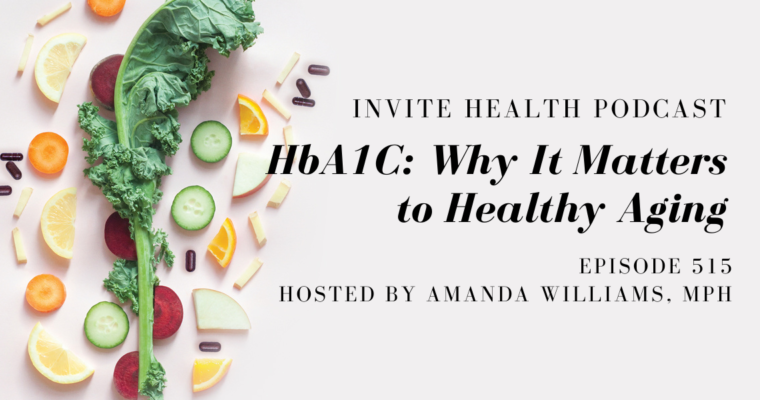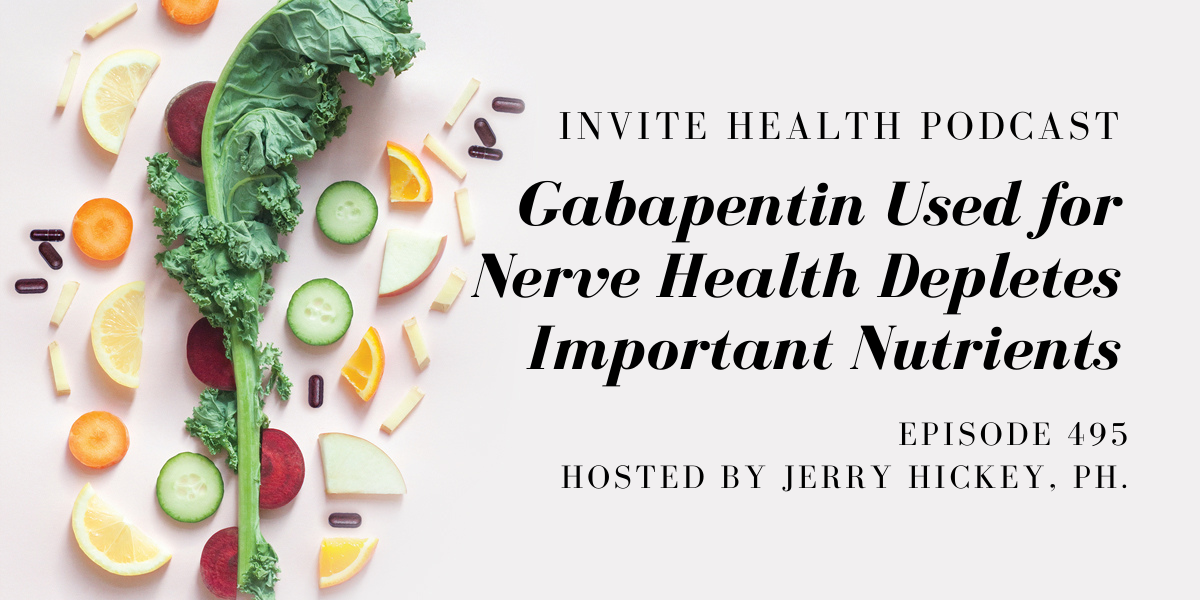gabapentin
Subscribe Today!
Please see below for a complete transcript of this episode.
Gabapentin Used for Nerve Pain Depletes Important Nutrients – InViteⓇ Health Podcast, Episode 495
Hosted by Jerry Hickey, Ph.
*Intro music*
InVite Health Podcast Intro: Welcome to the InViteⓇ Health Podcast, where our degreed healthcare professionals are excited to offer you the most important health and wellness information you need to make informed choices about your health. You can learn more about the products discussed in each of these episodes and all that InViteⓇ Health has to offer at www.invitehealth.com/podcast. First time customers can use promo code PODCAST at checkout for an additional 15% off your first purchase. Let’s get started!
*Intro music*
Jerry Hickey, Ph.:
[00:00:40] Gabapentin is an important drug. It’s commonly used for nerve pain, and it really does work. They use it for nerve pain related to diabetes. They use it for nerve pain related to shingles. We’ll talk about this a little bit later in the episode. It does have side effects. It also has important nutrient depletions. And interestingly, some of these nutrients are needed for nerve health. So welcome to my podcast episode, Gabapentin Used for Nerve Pain Can Deplete These Important Nutrients.† [00:01:15]
[00:01:17] Hi, my name is Jerry Hickey. I’m a nutritional pharmacist. I’m also the Senior Scientific Officer over here at InViteⓇ Health. Thanks for tuning in today to the InViteⓇ Health Podcast. You can find all of our episodes for free wherever you listen or visit invitehealth.com/podcast. Please subscribe and leave us a review. You can also follow us on Facebook, Twitter and Instagram @invitehealth. The information on this episode is linked at the episode description, so I really want to get going here.† [00:01:43]
[00:01:45] So gabapentin was originally created for epileptic seizures. It works by reducing inflammation and over excitation in the brain. It’s a GABA analog. GABA is gamma aminobutyric acid. That’s a neuro inhibitory neurotransmitter, so it’s used for, for, for seizures. So we’re not discussing that here. We’re not going into anticonvulsant medications here. I’m strictly talking about gabapentin here for nerve pain. It’s also known as Neurontin. Now, normally it’s used for herpes zoster infection nerve pain, that’s shingles. It’s called shingles. So when you were a kid, you had chickenpox. Chickenpox never leaves your system. Later on, for whatever reason, your immune system isn’t working up to snuff and the chickenpox comes back, but this time it’s called herpes zoster, and it could cause very bad nerve pain. Especially, it depends on where it is, you know, behind the ear, near the eyes. It could be quite dangerous if it comes out in the lungs. So when it comes out like in your chest or in your face or on your shoulders or something, it causes this burning stabbing pain. Now, the pain can last for months and some people, it lasts for years.† [00:03:13]
[00:03:15] There are supplements, by the way, that help with nerve pain. Alcar with ALA. We’ve already spoken about that in previous podcast episodes. Alcar with ALA. It stands for acetyl-L-carnitine and alpha lipoic acid. They work really well together for nerve pain. They’re also good for energy, and they’re good for your brain and memory. That’s a winner. And another one would be benfotiamine, which is a form of Vitamin B, one that’s very good for nerve pain.† [00:03:40]
CAN NUTRITION HELP WITH SHINGLES PAIN? – INVITE HEALTH PODCAST, EPISODE 362. Listen Now>>
[00:03:42] But let’s get back to gabapentin. So it’s normally used for shingles-related nerve pain. They have a time release, an extended time release, one called horizant that’s used for restless leg syndrome. Now, we don’t know how it works for that. We don’t know how it helps restless leg syndrome. Restless leg syndrome usually happens at night when you’re trying to sleep and you get this vague pain in your legs and you have this irresistible urge to move the legs to get comfortable, it could last for hours. So they do use gabapentin, that extended release, the time release one, for restless leg syndrome. For post-traumatic neuralgia, which is the shingles pain, it seems that the gabapentin changes the way your body senses pain. They also use it for diabetic peripheral neuropathy. Diabetic peripheral neuropathy is that tingling and that numbness that you get from nerve damage in people with diabetes. They do use it for hot flashes. You know, the sudden strong feelings of heating and sweat… Heat and sweating that you see in women being treated for breast cancer.† [00:04:53]
[00:04:56] Now, gabapentin, one of the problems with it is it makes some people really fatigued, really drowsy. It could cause serious drowsiness. So you don’t want to take it with marijuana, which is legal in some states. You don’t want to take it with alcohol, you don’t want to take it with any drug that makes you drowsy. That could be dangerous. Another problem is if you take an antacid with it, like the aluminum and magnesium antacids, it can block its absorption so you don’t want to take it at the same time as antacids. It can increase your risk of thinking of suicide. We call that suicidal ideation. I’ll get into this a little bit more later. So if you’re first trying gabapentin and you don’t know if it’s going to make you drowsy, you better be careful if you’re driving. So common side effects with gabapentin, I’ll tell you a weird one. Nystagmus. Nystagmus means dancing eyes. Your eyes are bouncing or they’re jerking, of your eyeballs so it can cause that it could cause drowsiness, of course. Dizziness. Anything that causes drowsiness because dizziness. Fatigue, obviously. Ataxia means you’re kind of wobbly and dizzy. You could fall over. Sedation. And it could cause swelling of like the arms and legs. We call that peripheral edema. Now, if you’re finding you’re take the drug for pain because you don’t want the pain from shingles, it can really hurt. It can really lost a long time. It can be horrible, but you start to get like mood changes, like you get confused or you’re becoming depressed or sad or fearful, or you start to think of suicide. Anything unusual like that you really should call your doctor right away.† [00:06:29]
[00:06:31] Now, here’s why we’re having this conversation. I’ve been doing a number of episodes, podcast episodes on drugs, how they interact with herbs and nutrients, are there nutrients that you should avoid if you’re on a drug, are there nutrients that make the drug work better, are there nutrients that the drugs are taking out of your system that can lead to health problems that you better replete your body with these nutrients. So it turns out that gabapentin does deplete the body of nutrients, and gabapentin is very commonly prescribed. There’s a lot of people with nerve pain. There’s a lot of diabetics, a lot of older people that suffer with shingles.† [00:07:06]
[00:07:08] So the drug can deplete biotin. And that’s a problem. It’s an important nutrient. Biotin was… Is involved with controlling your blood sugar. And there are studies showing that when you give biotin to people with diabetes, it can help improve their blood sugar control. But biotin’s also needed for nerve health. That’s why they’re thinking that biotin might help people with multiple sclerosis and multiple sclerosis, the coating of the nerves is damaged. It’s called the myelin sheath. The myelin sheath insulates nerves and makes messages travel quicker from your body to your brain. And in people with multiple sclerosis, the, the coating of the nerve is getting damaged. You need biotin to help correct that. So it doesn’t mean you have to stop gabapentin. But I think if you’re on gabapentin, you should be taking about a thousand to 2000 micrograms of biotin every day. Biotin’s also called Vitamin H. Now biotin is also involved with your nails. If you lack biotin, your nails get brittle. It doesn’t mean that if you have enough biotin, you could take more and get better nails. If you like it, you get brittle nails. But it’s also involved with unruly hair. There’s actually a syndrome called uncombable hair syndrome that runs in families. They can’t comb their hair. It looks like wool. Biotin helps that. If you lack biotin, your hair thins. Also, if you lack biotin, you tend to develop seborrheic dermatitis. It’s, it’s a kind of dandruff where it’s kind of like big, greasy, yellow, scaly stuff on your forehead. In fact, there’s some relationship to a lack of biotin and cradle cap in children, which is basically like seborrheic dermatitis. So if you are on this drug for neuropathy, gabapentin also called Neurontin, you need to take some biotin.† [00:09:12]
BIOTIN FOR MORE THAN YOUR HAIR AND NAILS – INVITE HEALTH PODCAST, EPISODE 394. Listen Now>>
[00:09:13] But you also probably need calcium and Vitamin D. The research is showing that when you take gabapentin, you’re depleted of calcium and Vitamin D. Now, calcium and Vitamin D obviously are needed for bone health. They’re not the only thing for bone health. We’ve done podcast episodes on that also, but they’re a major part of bone health. But calcium is also at the core of using calories for energy. Your mitochondria that use oxygen and calories for energy won’t work if you lack calcium. Your muscles don’t work well if you lack calcium. Your nerves don’t work well if you lack calcium. You become fatigued if you lack calcium. You also have a higher risk of colon cancer and in women breast cancer if you lack calcium. Calcium is a very important nutrient. So if you’re on… And Vitamin D, I mean, Vitamin D seems to be involved with everything in the human body, including the immune system, building bone. It just, it just has so many different effects. Reducing inflammation, helping to fight and helping to prevent cancer. Helping treat diabetes. You need for activated Vitamin D to help regulate your blood sugar. It interacts with the mineral magnesium and the mineral zinc to regulate your blood sugar. So if you’re on gabapentin, not only should you be taking some calcium and Vitamin D, you should be taking some biotin.† [00:10:34]
[00:10:35] There’s also evidence that gabapentin depletes two major B-vitamins, Vitamin B12 and folate. That’s really important. B12, methylcobalamin and adenosylcobalamin in your body. That’s what it converts into. B12 is needed to help prevent your brain from shrinking and memory loss with age. And B12 is needed to create red blood cells. Without, without B12, you develop megaloblastic anemia, where your red blood cells get too big and they don’t work well and you become very fatigued. But B12 has also been shown to lower the risk of developing colon cancer, and B12 is one of nutrients involved with energy production your heart needs. But B12 is also needed for nerve health, so here’s gabapentin being used for nerve pain and it’s depleting biotin, and it’s depleting B12, both which are needed for nerve health, and they’re both needed for brain health. Now gabapentin also depletes folate, and that’s a problem. Lacking folate increases the level of a molecule in the brain called homocysteine that damages the brain that can lead to brain inflammation and depression. But it’s also a big risk factor for Alzheimer’s disease. Now, beyond that, folate is needed to help prevent heart disease by once again regulating homocysteine. But folate’s also needed to create good genes and healthy cells. So if you lack the active form of B12, which which is called methyltetrahydrafolate, I’m sorry, not B12, folate, we’re talking folate here. If if you like the active version of folate, methyltetrahydrafolate, you have a higher risk of cancer because methyltetrahydrafolate helps block the first two steps in the cancer process called initiation and promotion. Like, like a combination of a virus and radiation can damage your DNA inside your chromosomes so badly it can lead to the cancer process. Methyltetrahydrafolate helps prevent that, so you need methyltetrahydrafolate for a healthy heart. You need it for a healthy brain and to lower the risk of Alzheimer’s disease, and you need it to lower your risk of cancer, yet gabapentin is depleting it. Simple. Take it. Now, normally in a multivitamin you get folic acid, synthetic folate. Folate is named for foliage. It’s ubiquitous in plants, but it’s not easy to derive out of plants. So they add inexpensive folic acid to multivitamins because they can make a better profit like that. But it doesn’t work for everybody. A lot of people have trouble converting it to the active form. So look for a vitamin that has the active B12 methylcobalamin because that creates all the forms of B12 in your body and look for a folate that’s the active form of folate called methyltetrahydrafolate. You’ll be better off.† [00:13:26]
[00:13:26] So if you’re on gabapentin, it really should help with your nerve pain. Just be careful because it can make you feel sleepy, sedated, and you need to take the following nutrients separate, at a separate time from the gabapentin just to make sure they don’t collide in the intestines and cause a problem. Biotin, calcium, Vitamin D, active B12, which is methylcobalamin, and active folate, which is methyltetrahydrafolate.† [00:13:52]
[00:13:54] OK, thanks for listening to today’s episode of the InViteⓇ Health Podcast. You can find all of our episodes for free wherever you listen to podcasts. We have hundreds, hundreds of them on our website. I think it must be approaching 500 by now. So that’s invitehealth.com/podcast. Subscribe and leave us a review, if you could. You can follow us on Twitter, Instagram and Facebook @invitehealth and I hope to see you next time on another episode of the InViteⓇ Health Podcast. Thank you so much for listening. This is Jerry Hickey signing off.† [00:13:54]











